InterVarsity Press
P.O. Box 1400, Downers Grove, IL 60515-1426
World Wide Web: www.ivpress.com
Email:
2014 by Amy Simpson
All rights reserved. No part of this book may be reproduced in any form without written permission from InterVarsity Press.
InterVarsity Press is the book-publishing division of InterVarsity Christian Fellowship/USA, a movement of students and faculty active on campus at hundreds of universities, colleges and schools of nursing in the United States of America, and a member movement of the International Fellowship of Evangelical Students. For information about local and regional activities, write Public Relations Dept., InterVarsity Christian Fellowship/USA, 6400 Schroeder Rd., P.O. Box 7895, Madison, WI 53707-7895, or visit the IVCF website at www.intervarsity.org .
Unless otherwise indicated, all Scripture quotations are taken from the Holy Bible, New Living Translation, copyright 1996, 2004. Used by permission of Tyndale House Publishers, Inc., Wheaton, Illinois 60189. All rights reserved.
While all stories in this book are true, some names and identifying information in this book have been changed to protect the privacy of the individuals involved.
Cover design: Cindy Kiple
Images: Michael Duva/Getty Images
ISBN 978-0-8308-9653-0 (digital)
ISBN 978-0-8308-4314-5 (print)
This book is dedicated to Trevor,
who walks with me through worry
and reminds me to believe whats true;
To my sisters, Cheryl and Kate,
who have shared so many of my worries
and traveled with me toward greater trust in
the One who has always been there for us;
And to my children,
my greatest reasons for worry;
With all thanks and gratitude to God,
who loves me despite my worry
and is my only reason not to.
Contents
Introduction
L et me start by telling you what this book is not.
This is not a book with five easy steps to free yourself from anxiety. It offers some practical advice, but ultimately it is focused less on changing behavior and more on letting God transform the way we see himand ourselves by comparison.
This book is not a substitute for counseling or therapeutic understanding. It does attempt to define and clarify differences between fear, anxiety and worry, and as you read, I hope it will lead to a better understanding of yourself. But its soul is theological and spiritual, not psychological or medical.
This book is not written to shame people who have anxiety disorders and who often hide in fear that others will judge them for their lack of control over anxious thoughts and feelings and the physical symptoms that threaten to overwhelm them. Historically, our society is quick to judge such disorders, to chalk them up to personal weakness or sin or demonic control, to prescribe more faith or more prayer or just getting over it. But anxiety disorders are illnesses with very real physical and emotional symptoms, and theres no more shame in this than any other kind of illness. The remedy is not in a book; its in medical help and sound counseling to help retrain runaway thoughts and beliefs that fuel emotions.
This is a book primarily for the rest of us, who think worry is a problem for those worriers. Ironically, while were so quick to judge people who cant control their anxiety, we go very easy on ourselves if we can control our anxietyeven if we choose not to. Many of us believe a certain amount of worry is perfectly OK, even commendable. As long as we stay in control, as long as our worry doesnt become excessive, its not a problem.
And yet it is a problem. Its our very control that indicts us. While some may not choose to worry, the rest of us actually do. Such a choice is an act of rebellion against God, who requires our trust. And were far more worried than we think we are.
This is a book for people like me, who, until the last few years, never thought I was a worrier. I was so accustomed to living with a certain level of fear that I felt but couldnt see, I truly believed I didnt have a problem with worry. And yet each day I moved from worry to worry, fueled by an anxiety so constant I noticed it only when it spiked to a level higher than usual. I allowed it to alter my course, mute my sense of calling, keep me quiet when I should have spoken and keep me speaking when I should have been silent.
That is, until Gods Holy Spirit confronted me with the way God describes himself in his Word. He pointed out descriptions of his power, sovereignty, infinite nature and goodness, and these biblical passages painted vivid pictures for mepictures I hadnt really seen before. I began to see how weak and tenuous my trust was by comparison. And I began to notice a theme throughout Gods story, a call for people to release their cradling hold on fear, turn away from it and trust him. This theme goes far beyond the dont worry passages so frequently quoted on refrigerator magnets and weaves its way through familiar stories I now saw through a new lens.
Worry is not the same as fear; its the practice of indulging fear, clinging to it, feeding and serving it.  Worry is a cheap substitute for productive action and for surrender to someone with capabilities and perspective far beyond our own. For many of us, our relationship with worry is even more perverse: we wave it as a flag of self-importance, fly it over our own castles and kingdoms to proclaim to the world around us that we are responsible, capable, indispensable.
Worry is a cheap substitute for productive action and for surrender to someone with capabilities and perspective far beyond our own. For many of us, our relationship with worry is even more perverse: we wave it as a flag of self-importance, fly it over our own castles and kingdoms to proclaim to the world around us that we are responsible, capable, indispensable.
This is not an uncommon condition. Erecting our own castles, in monument to ourselves and in defense of all we think we possess, is a distinctly human activity. And we live in a culture that expects such worried kingdom building. Anyone without a castle is out in the cold. And anyone without a flag of worry is likely to be overlooked or disdained as irresponsible, uninterested, unaware.
But just because such a practice is definitively human doesnt mean its harmless. Anyone familiar with the effects of anxiety and fear knows they can destroy a person. And this destruction is not limited to our physical selves; a lifestyle of worry is incompatible with a life of faith. A castle of our own, erected by our own pride, forms a wall between us and God, and must be dismantled lovingly by a generous King who invites us into his kingdom, a kingdom that needs no wall, a fortress of impenetrable strength, a place of welcome and love and beauty and peace that will never be abandoned.
In this age, as in all ages, we are most sensitive to the sins that violate prevailing cultural norms in addition to Gods standards: in our current climate, sins like theft, infidelity, murder, cruelty, abuse. But we struggle even to see the ones that are camouflaged in our society: consumerism, self-absorption, self-righteousness, selfish ambition. And worry. Its in the water we drink and use for washing.
This book will help you see the poison in the water and the pervasive presence of worry in your own life. Its a book designed to confront and transform the culture among people who follow Jesus. To challenge us all to be set apart by our refusal to buy into the illusions of control and possession and to engage in the practice of worry so prevalent in the world around us. We must let go of the mistaken belief that life can and should be safe. That our powers extend farther than what God has granted us. That our chief purpose in this life is to avoid danger and accumulate treasures. That we possess and must preserve that which actually belongs to God. That the future, where all our greatest hopes and worries lie, is a promise we can claim for ourselves.


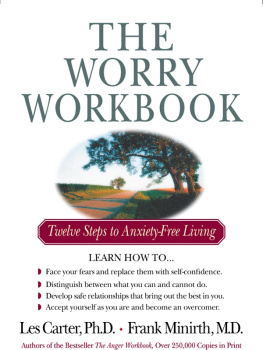
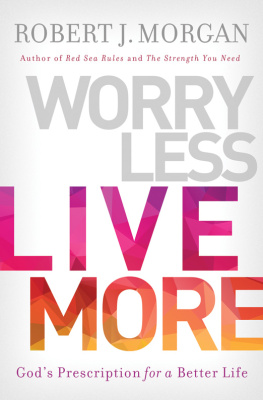
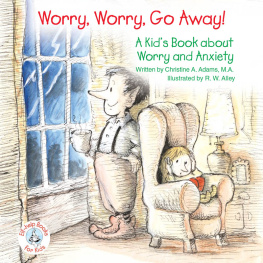

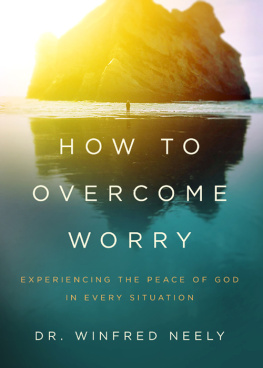
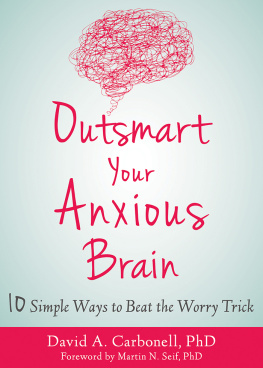
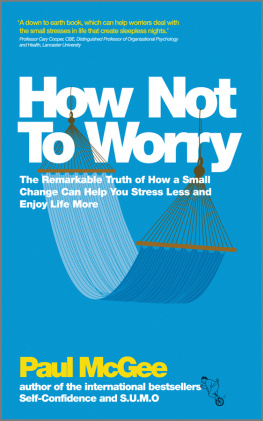
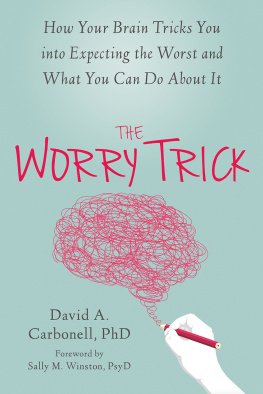
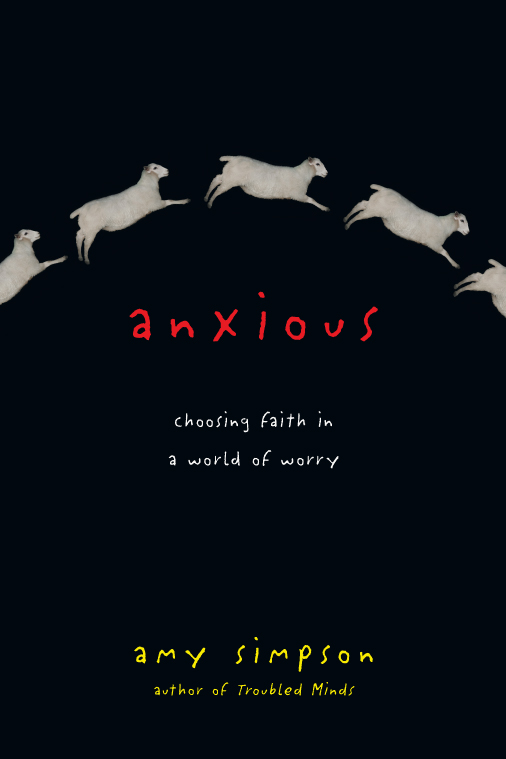
 Worry is a cheap substitute for productive action and for surrender to someone with capabilities and perspective far beyond our own. For many of us, our relationship with worry is even more perverse: we wave it as a flag of self-importance, fly it over our own castles and kingdoms to proclaim to the world around us that we are responsible, capable, indispensable.
Worry is a cheap substitute for productive action and for surrender to someone with capabilities and perspective far beyond our own. For many of us, our relationship with worry is even more perverse: we wave it as a flag of self-importance, fly it over our own castles and kingdoms to proclaim to the world around us that we are responsible, capable, indispensable.